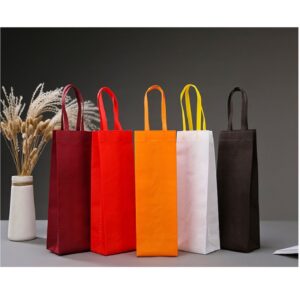In addition to non-woven polypropylene (PP) fabric, there are several other materials commonly used for reusable bags.
Here are some of them:
Cotton Canvas: Cotton canvas is a popular material for reusable bags due to its sturdiness and durability. It is a woven fabric made from cotton fibers and is known for its strength. Cotton canvas bags can carry heavy items and are often used for grocery shopping, beach trips, and everyday use.
Jute: Jute is a natural fiber derived from the jute plant. It is a strong and eco-friendly material used for making reusable bags. Jute bags have a rustic and natural appearance and are commonly used for shopping, gift packaging, and promotional purposes.
Polyester: Polyester is a synthetic fabric that is lightweight, durable, and water-resistant. Reusable bags made from polyester are often used for outdoor activities, sports, and travel. They are known for their strength and ability to withstand wear and tear.
Nylon: Nylon is another synthetic material commonly used for reusable bags. It is lightweight, water-resistant, and has excellent tear resistance. Nylon bags are often foldable and compact, making them convenient for carrying in handbags or pockets as an extra bag when needed.
Recycled Materials: Reusable bags can also be made from recycled materials such as recycled PET (polyethylene terephthalate) or recycled plastic bottles. These materials help reduce waste and give a new life to existing resources.
Hemp: Hemp is a sustainable and eco-friendly material derived from the hemp plant. It is known for its strength and durability and is used to make durable and long-lasting reusable bags.
Organic or Fair Trade Fabrics: Reusable bags made from organic cotton or fair trade fabrics are also available. These materials are produced using environmentally friendly and socially responsible practices, promoting sustainability and ethical sourcing.
The choice of material for a reusable bag depends on factors such as desired strength, durability, eco-friendliness, and intended use. Each material has its own characteristics and benefits, so it’s important to consider your specific requirements when selecting a reusable bag.
Which material is the most eco-friendly option for reusable bags?
When it comes to eco-friendliness, materials that are renewable, biodegradable, or made from recycled sources are generally considered more environmentally friendly options for reusable bags.
Here are some materials that are commonly regarded as eco-friendly for reusable bags:
Organic Cotton: Bags made from organic cotton are considered eco-friendly because the cotton is grown without the use of synthetic fertilizers or harmful pesticides. non woven bag supplier Organic cotton is biodegradable and has a lower impact on soil and water resources compared to conventionally grown cotton.
Jute: Jute is a natural fiber derived from the jute plant, making it a sustainable and biodegradable material for reusable bags. Jute is known for its low water and fertilizer requirements during cultivation, and it can be grown without the use of pesticides. Jute bags are also durable and have a natural rustic appearance.
Hemp: Hemp is a highly sustainable and eco-friendly material. It is a fast-growing plant that requires minimal water and no pesticides for cultivation. Hemp fibers are strong and durable, making them suitable for reusable bags. Additionally, hemp plants help improve soil quality and have a lower carbon footprint compared to many other crops.
Recycled Materials: Reusable bags made from recycled materials, such as recycled PET (polyethylene terephthalate) or recycled plastic bottles, contribute to reducing waste and the demand for new resources. Using recycled materials helps divert waste from landfills and reduces the energy and water consumption associated with producing new materials.
Biodegradable Materials: Some reusable bags are made from biodegradable materials such as bioplastics derived from renewable resources like cornstarch or vegetable oils. These bags have the ability to break down naturally over time, reducing their impact on the environment.
It’s worth noting that eco-friendliness depends not only on the material but also on factors such as production practices, transportation, and the lifespan of the bag. Choosing a durable reusable bag and using it over an extended period can significantly reduce overall environmental impact, regardless of the specific material used.

